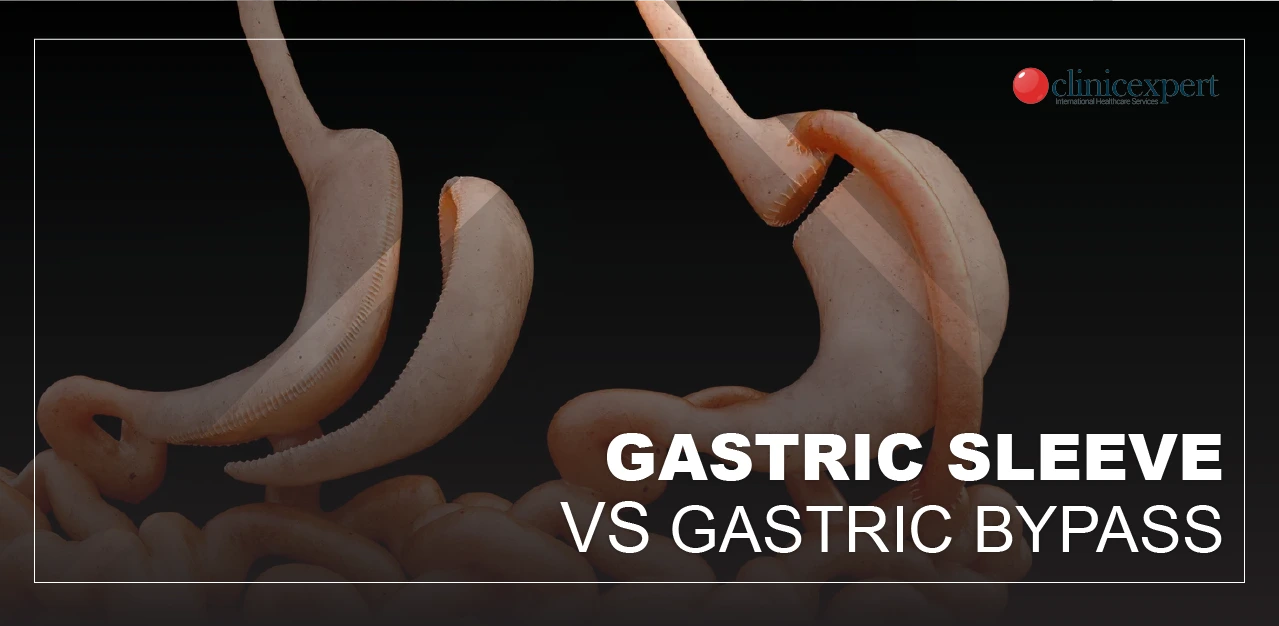Gastric Sleeve vs. Gastric Bypass
Embarking on the journey towards weight loss surgery is an important decision. After all, when it comes to bariatric surgery, there are multiple options. One must carefully consider and understand the available options before making a final decision. For individuals facing obesity and looking for effective solutions, two major procedures often become the focus: Gastric Sleeve and Gastric Bypass. Both surgeries have proven to be successful in helping patients lose significant weight and improve their overall health. However, the choice between Gastric Sleeve and Gastric Bypass is not a one-size-fits-all option; your doctor will make the best decision on which operation is better for you.
However, we hope that this article will provide useful information for those who want to get some preliminary information or those who want to eliminate the question marks in their minds! Before we start, you can always contact our health consultants to get detailed information about all weight loss surgeries, including gastric bypass and gastric sleeve, free of charge.
Exploring Gastric Sleeve and Gastric Bypass Options
When it comes to weight loss surgery, understanding the available options is a crucial step in making an informed decision that aligns with individual health needs and goals. Sleeve gastrectomy and Gastric Bypass represent two distinctive pathways towards achieving significant weight loss, each with its own set of considerations.
Gastric Sleeve Procedure Overview
Gastric Sleeve, a minimally invasive surgical option, involves the removal of a significant portion of the stomach, leaving a smaller, tube-like structure behind. This reduction in stomach size not only limits the amount of food it can hold but also alters the hormonal signals related to hunger, contributing to weight loss. The surgery typically takes about 1 to 2 hours, and the recovery period is comparatively shorter than more intricate procedures.
Candidacy and Considerations
Candidates for Gastric Sleeve are often those with a BMI (Body Mass Index) of 40 or higher or individuals with a BMI of 35 or higher with obesity-related health issues. It is essential for potential candidates to consider the irreversible nature of the surgery and commit to long-term lifestyle changes for optimal results.
Gastric Bypass Procedure Overview
Gastric Bypass, known as Roux-en-Y Gastric Bypass, involves the creation of a small stomach pouch and the rerouting of the digestive tract. This intricate procedure restricts the amount of food the stomach can hold and alters the absorption of nutrients, leading to significant weight loss. The surgery typically takes longer than Gastric Sleeve; ranging from 2 to 4 hours, and requires a more extended recovery period.
Candidacy and Considerations
Candidates for Gastric Bypass often include those with a BMI of 40 or higher. Individuals with a BMI of 35 or higher with obesity-related health conditions can also consider gastric bypass. The potential for rapid and substantial weight loss makes it an appealing option for those seeking more immediate results. However, the complexity of the surgery necessitates a commitment to postoperative care and lifestyle changes.
The Pros and Cons of Gastric Sleeve and Gastric Bypass
Pros of Gastric Sleeve
One of the primary advantages of the Gastric Sleeve procedure, also known as Sleeve gastrectomy, is its simplicity. This operation does not involve re-routing the digestive tract. Patients generally experience faster recovery time and less risk of nutritional deficiencies.
Cons of Gastric Sleeve
The irreversible nature of the surgery means that postoperative adjustments are limited. In addition, while nutrient absorption remains largely intact, the risk of vitamin deficiencies still exists, emphasizing the importance of post-operative nutritional follow-up.
Pros of Gastric Bypass
Gastric Bypass or Roux-en-Y Gastric Bypass is a more complex procedure. It involves the creation of a small stomach pouch and rerouting of the digestive tract. Its effectiveness in achieving significant and rapid weight loss is a notable advantage. The surgery often results in improvement in obesity-related conditions such as type 2 diabetes and hypertension.
Cons of Gastric Bypass
On the other hand, the complexity of Gastric Bypass surgery brings higher risks of complications compared to Gastric Sleeve. The potential for malnutrition is more pronounced due to the altered digestive tract. Furthermore, long-term follow-up and adherence to dietary and lifestyle changes are crucial for sustainable success.
Which One is More Effective?
Ultimately, the effectiveness of Gastric Sleeve versus Gastric Bypass hinges on individual circumstances. Your medical history, lifestyle preferences, and desired pace of weight loss all play pivotal roles in this decision-making process. It’s crucial to consult with a qualified healthcare professional specializing in weight loss surgery. They can help you choose the option that aligns best with your goals.
In essence, there’s no one-size-fits-all answer to the question of effectiveness. Both procedures have a track record of success in enabling individuals to achieve substantial weight loss and enhance their overall well-being. Your journey toward a healthier you begins by carefully considering these factors; seeking advice from experts, and committing to the lifestyle changes necessary for long-term success. Remember, it’s about finding the approach that suits you best and sets you on the path to a healthier, happier life.

